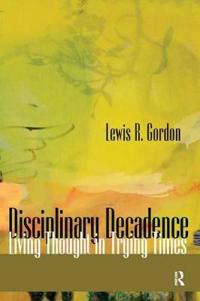Integrative Theology (Inbunden)
avGordon R. Lewis, Bruce A. Demarest, Gordon R. Lewis
ISBN: 9780310521105 - UTGIVEN: 2014-08This three-volume set of Integrative Theology is designed to help students in a pluralistic world utilize a standard method of fruitful research. Each chapter on a major doctrine: (1) states a classic issue of ultimate concern; (2) surveys alternative past and present answers; and (3) tests those pr[...]
Existentia Africana (Pocket)
avLewis R. Gordon
ISBN: 9780415926447 - UTGIVEN: 2000-07-01The intellectual history of the last quarter of this century has been marked by the growing influence of Africana thought--an area of philosophy that focuses on issues raised by the struggle over ideas in African cultures and their hybrid forms in Europe, the Americas, and the Caribbean. "Existentia[...]
What Fanon Said (Inbunden)
avLewis R. Gordon, Sonia (FRW) Dayan-herzbrun, Drucilla (AFT) Cornell
ISBN: 9780823266081 - UTGIVEN: 2015-04Antiblack racism avows reason is white while emotion, and thus supposedly unreason, is black. Challenging academic adherence to this notion, Lewis R. Gordon offers a portrait of Martinican-turned-Algerian revolutionary psychiatrist and philosopher Frantz Fanon as an exemplar of "living thought" agai[...]
What Fanon Said (Pocket)
avLewis R. Gordon, Sonia (FRW) Dayan-herzbrun, Drucilla (AFT) Cornell
ISBN: 9780823266098 - UTGIVEN: 2015-04Antiblack racism avows reason is white while emotion, and thus supposedly unreason, is black. Challenging academic adherence to this notion, Lewis R. Gordon offers a portrait of Martinican-turned-Algerian revolutionary psychiatrist and philosopher Frantz Fanon as an exemplar of "living thought" agai[...]
Aggression, Antisocial Behavior, and Violence Among Girls (Inbunden)
avLewis R. Gordon
ISBN: 9781572309944 - UTGIVEN: 200409From leading interdisciplinary authorities, this book traces the development of female aggression and violence from early childhood through adulthood. Cutting-edge theoretical perspectives are interwoven with longitudinal data that elucidate the trajectories of aggressive girls' relationships with p[...]
Bad Faith and Antiblack Racism (Pocket)
avLewis R. Gordon
ISBN: 9781573925341 - UTGIVEN: 1995-02Lewis Gordon presents the first detailed existential phenomenological investigation of anti-black racism as a form of Sartrean bad faith. Bad faith, the attitude in which human beings attempt to evade freedom and responsibility, is treated as a constant possibility of human existence. Anti-black rac[...]
Disciplinary Decadence (Häftad)
avLewis R. Gordon
ISBN: 9781594512568 - UTGIVEN: 200612In this book, philosopher and social critic Lewis Gordon explores the ossification of disciplines, which he calls disciplinary decadence. In response, he offers a theory of what he calls a teleological suspension of disciplinarity, in which he encourages scholars and lay intellectuals to pay attenti[...]









